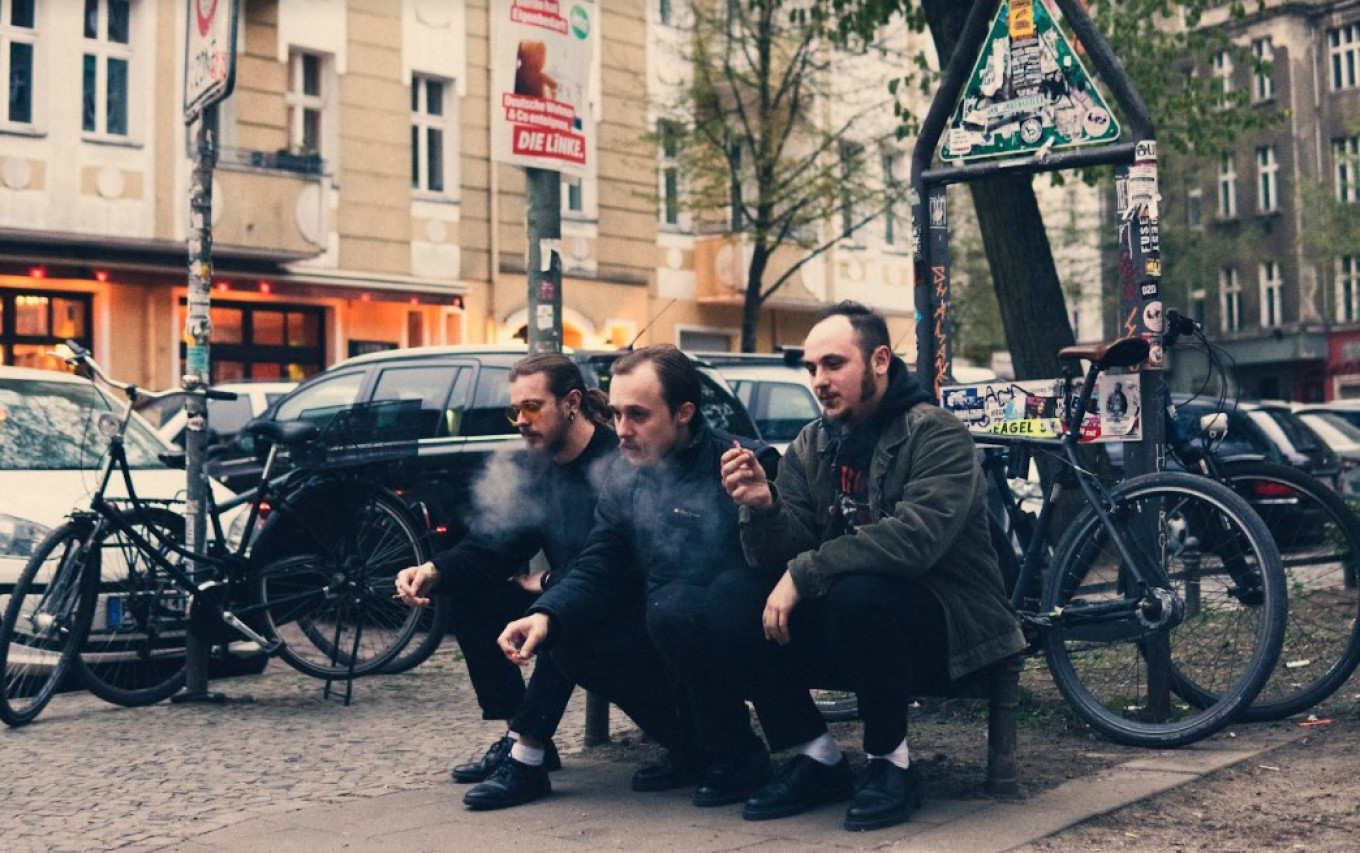Meet Molchat Doma, the most popular Russian-speaking band in the world. And it might get even more popular very soon: it has been picked for the line-up at the Coachella Music Fest in California this spring.
Molchat Doma (“Houses are Silent”) is a trio from working-class Minsk in Belarus: vocalist Egor Shkutko, guitar and synth-player Roman Komogortsev, and bassist and keyboardist Pavel Kozlov. They play post-punk and cold-wave music slightly reminiscent of the 80s.
In 2021, the group’s music was streamed on Spotify 120 million times. Their most famous track, “Sudno” (Bedpan), has been streamed 121 million times since it came out in 2018 — three times more than popular Russian rapper Morgenshtern’s biggest hit.
Molchat Doma have been signed by the American indie label Sacred Bones, which puts out LPs of the Japanese experimental rock band Boris, David Lynch, director and composer John Carpenter, singer-songwriters Jenny Hval and Zola Jesus. The label’s website calls Molchat Doma’s music “dark yet danceable.”
Despite world fame, the Belorussian band is not widely popular in Russia. It’s easier to hear their tracks on London-based NTS Radio than in a taxi in Moscow.
“Sudno” and TikTok fame
The band’s initial success came from social media. The trio got famous overnight when YouTube user Harakiri Diat bought their album “Etazhi” (Floors) on vinyl, digitized it and uploaded to his channel. In January 2019 a YouTube algorithm started recommending it on the platform. And their fame took off.
“These emotions are still the strongest for me — when we were unaware of it, and somebody texted us what was going on. The album got 25,000 new listens every day. By spring we had half a million,” Kozlov told The Moscow Times.
Then TikTok followed suit. Teenagers set a trend of changing outfits to “Sudno,” the band’s signature track. By late 2020 “Sudno” had been featured in 150,000 TikToks.
The band has no idea why the trend appeared.
“Everybody’s trying to connect it to our label. But Sacred Bones had nothing to do with it… They broke the news to us,” said Komogortsev. He added that this is how they heard about TikTok for the first time.
They owe the success of their biggest hit “Sudno” to late Russian poet Boris Ryzhy, who wrote the poem the band took as the lyrics: a dark and bitter existential grievance. The acclaimed poet from the Urals committed suicide at age 26, leaving a wife and a child behind. The song seems to be about being in a psychiatric hospital after trying to commit suicide: “Enameled bedpan/Window, bedside table and a bed/Living is hard and uncomfortable/But it’s comfortable to die.”
The band doesn’t seem to be disappointed by much of the public’s superficial understanding of the song.
“It’s a pity that the meaning of the song got lost behind [the trend]…but on the other hand, more people heard the music. Even if one out of a hundred viewers gets hooked on the music and not the trend, that’s a good start,” Kozlov said.
Politics lite
The ingredients of their music are atmospheric synths, a rhythmic drum machine, the baritone vocals of Egor Shkutko and compelling guitar melodies. Listen to “Volny” (Waves) once and you can’t get it out of your mind.
“I belong to this music. Even if I don't understand a single word, I can feel it describing my melancholy. This incredibly touches my soul. Music has no language. Love u Molchat Doma,” wrote a YouTube user under the video.
It might seem like the band is singing about the political turmoil in Belarus in recent years in “Volny”: “You make me sing songs about nature/You make me believe in your God/There’s bad weather in my land/You make me believe in your God.” And the images of Chernobyl might suggest criticism of past governments.
But the song came off the 2018 album “Etazhi.” It was inspired by the band’s first concert outside Belarus at a club in St. Petersburg. The chorus came from Shkutko’s mother, who wasn’t happy with the band’s lyrics and suggested they sing about nature and God.
Molchat Doma doesn’t publicly criticize any of the major forces in Belarus. “It doesn’t mean that we have no civic stance,” Kozlov said. “But we don’t have to sing about it. We weren’t going to from the start,” he continued.

California calling
After the group performs at Coachella in April, they plan to go on tour in the U.S. and Canada with about 30 concerts. The group put out a statement that they were honored to be asked to perform at the California festival, adding, “We’re a bit nervous, but we hope it will all turn out cool.”
Right now they’re working on a song together with Russian rock band Bi-2, also originally from Belarus. It’s not surprising that one of the Bi-2 musicians came across a Molchat Doma album in a Californian record store.
Apparently, knowing Russian isn’t a prerequisite for foreigners to love bands from the CIS.
“Vocals are like a separate instrument. I guess that's how it works,” Kozlov said.
A Message from The Moscow Times:
Dear readers,
We are facing unprecedented challenges. Russia's Prosecutor General's Office has designated The Moscow Times as an "undesirable" organization, criminalizing our work and putting our staff at risk of prosecution. This follows our earlier unjust labeling as a "foreign agent."
These actions are direct attempts to silence independent journalism in Russia. The authorities claim our work "discredits the decisions of the Russian leadership." We see things differently: we strive to provide accurate, unbiased reporting on Russia.
We, the journalists of The Moscow Times, refuse to be silenced. But to continue our work, we need your help.
Your support, no matter how small, makes a world of difference. If you can, please support us monthly starting from just $2. It's quick to set up, and every contribution makes a significant impact.
By supporting The Moscow Times, you're defending open, independent journalism in the face of repression. Thank you for standing with us.
Remind me later.






